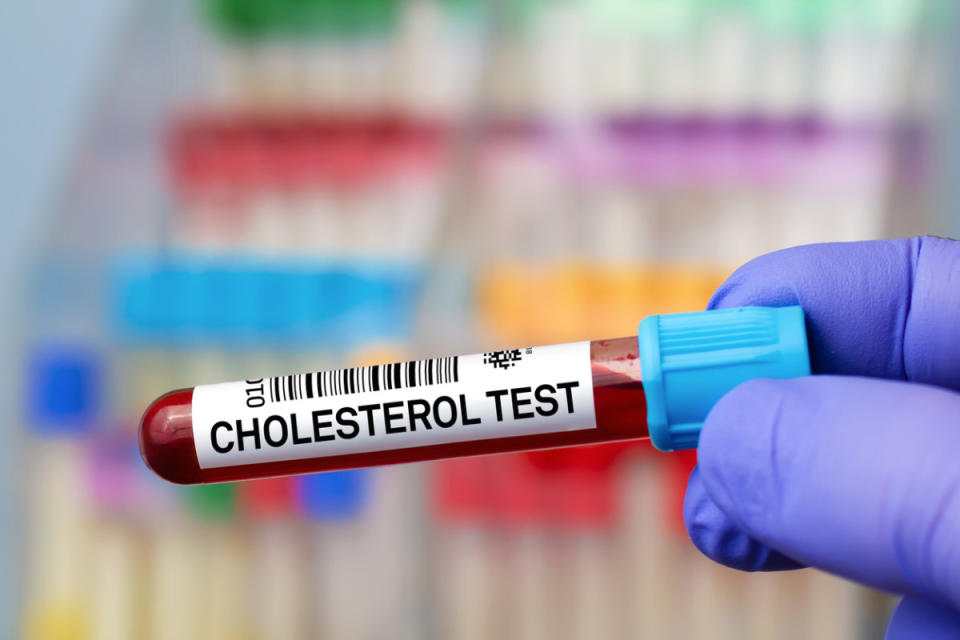The Common Mistake That Could Be Wreaking Havoc on Your Cholesterol, According to Cardiologists

According to a new survey conducted by Harris Poll and the American Heart Association, 70 percent of heart attack and stroke survivors had no idea that LDL cholesterol is commonly referred to as “bad cholesterol” because it contributes to the buildup of fat in the arteries. The survey also found that 75 percent of heart attack and stroke survivors reported having high LDL cholesterol, but only 49 percent prioritized lowering it.
The poll shows that, clearly, many people don’t know about the negative impact LDL cholesterol can have on heart health—a major concern since cardiovascular disease is the number one cause of death in the U.S. In fact, there is one mistake in particular that cardiologists say many people make—putting themselves directly at risk.
Related: 25 Foods That Are Good for Your Heart, From Fruits and Veggies to Heart-Healthy Nuts and Seeds
The Common Mistake That Could Be Wreaking Havoc on Your Cholesterol
Dr. Donald Lloyd-Jones, MD, the Chair of the Department of Preventive Medicine at Northwestern University’s Feinberg School of Medicine and the past president of the American Heart Association, says that many people have a mix of genes that make them more prone to absorb cholesterol and saturated fats from their diet. This makes them more at risk of having high cholesterol. “Blood levels of LDL-cholesterol are a major causal risk factor for cardiovascular disease,” Dr. Lloyd-Jones says.
The problem, he says, is that many people don’t realize their risk. This is exactly why Dr. Lloyd-Jones says that it’s important to know what your cholesterol numbers are and find out if you are sensitive to dietary cholesterol. He says that not working with a doctor to find out one’s cholesterol numbers and risk is the number one mistake people make when it comes to managing cholesterol.
Related: Your Live-Well Guide to Maintaining Heart Health and Preventing Heart Disease
What happens if you go to the doctor and find out you’re at elevated risk or your LDL cholesterol numbers are already high? Dr. Lloyd-Jones says that then, it’s important to be mindful of your diet—restricting dairy fats, egg yolks and red meat.
“For cholesterol specifically, we tend to focus on diet more than exercise,” says Dr. Karishma Patwa, MD, a cardiologist with Manhattan Cardiology and contributor to LabFinder.com. She explains that frequently eating foods high in saturated fat can cause a rise in LDL cholesterol. But she adds that there’s an important connection between diet and cholesterol that many don’t know. “What some people don’t know is that sugary and high glycemic index foods contribute to elevated triglyceride levels, which also pose a cardiovascular risk,” she says. In other words, it isn’t just foods that are high in saturated fat that can negatively impact LDL cholesterol; high-sugar and high-glycemic foods can too.
Related: Cardiologists Swear By This One Daily Habit To Improve Heart Health
How To Minimize Your Risk for High Cholesterol
How can you apply the doctors’ insights to your life and lower your risk for high cholesterol? First, as Dr. Lloyd-Jones emphasized, it’s important to know your cholesterol numbers. He says that some people with high cholesterol can benefit from taking prescription medication. However, he emphasizes that medication is not a substitute for healthy diet and lifestyle habits.
To that end, this means that if you have high cholesterol, it’s important to minimize foods high in saturated fat, high in sugar or that have a high glycemic index. Examples of high glycemic foods include drinks high in sugar (like soft drinks or flavored coffee drinks), pastries, white bread and white potatoes.
“While it’s hard to eliminate food groups completely, focusing on a heart-healthy diet is a good place to start,” Dr. Patwa says. “Focus on fresh fruits and vegetables, whole grains, beans and legumes, fish and seafood, and healthy fats.”
She also says it’s important to get regular exercise (the AHA recommends aiming for 150 minutes a week of moderate-intensity exercise), minimizing alcohol consumption and avoiding tobacco products.
Once someone commits to following these recommendations, both cardiologists say that it’s absolutely possible to turn high cholesterol numbers around. “Lifestyle changes, if sustained, can be reflected in blood cholesterol levels in as little as four to six weeks,” Dr. Lloyd-Jones says.
You hold your heart health in your hands; it’s up to you alone to minimize your risk for cardiovascular disease—and that starts by managing your cholesterol. Know your numbers and act accordingly. You have the power to take control of your health!
Next up, see the seven lifestyle changes that will make your heart healthier.
Sources
Dr. Donald Lloyd-Jones, M.D., Chair of the Department of Preventive Medicine at Northwestern University’s Feinberg School of Medicine and the past president of the American Heart Association
Dr. Karishma Patwa, MD, a cardiologist with Manhattan Cardiology and contributor to LabFinder.com

